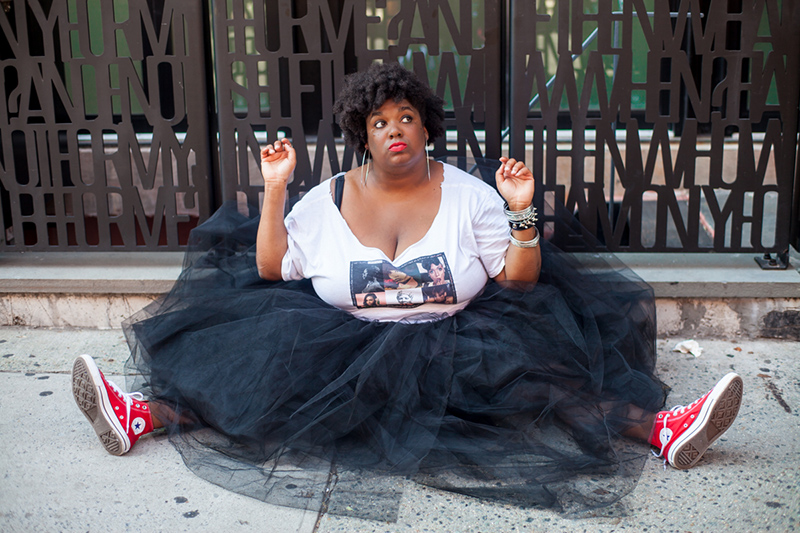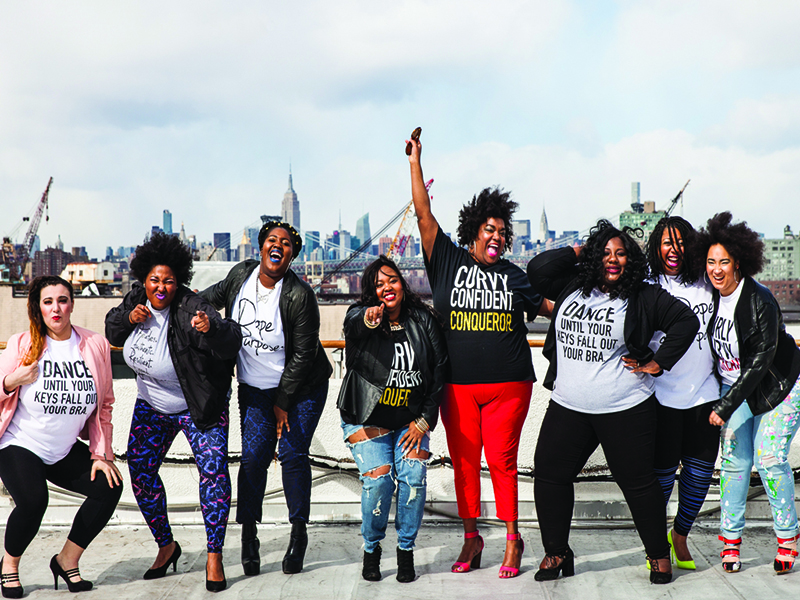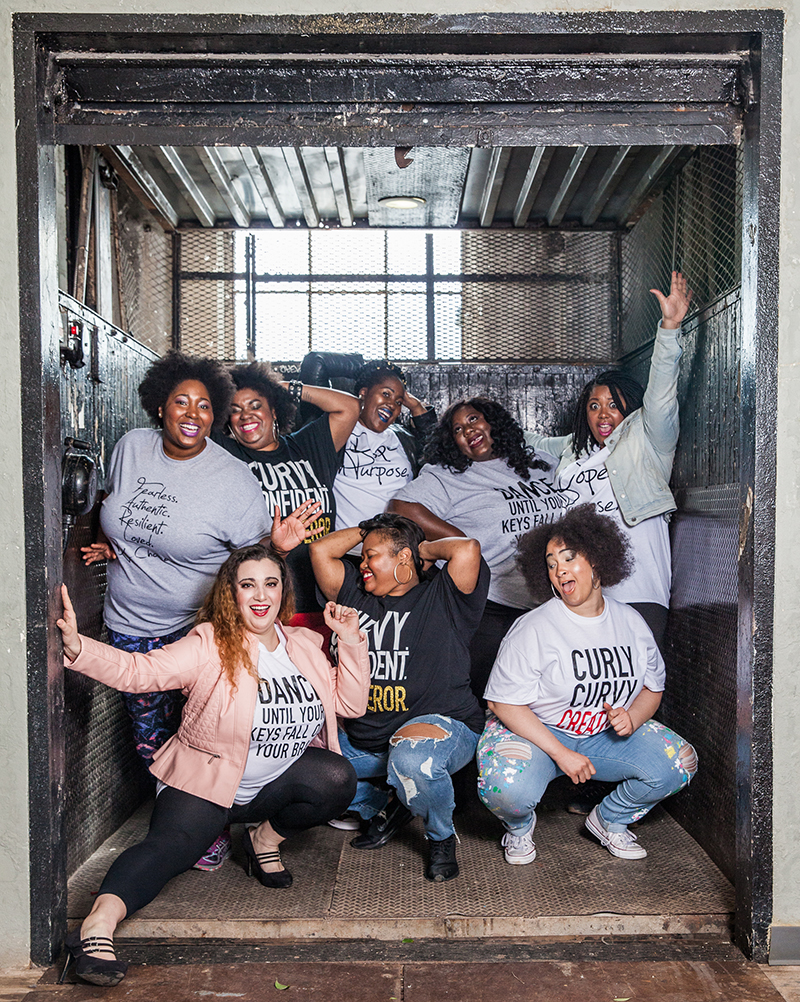Fat Black Lady Dancing in Living Room Funny
The Power of Fat Girls Dancing
An Interview with Cathleen Meredith of FATGIRLSDANCE™
BY EMMALY WIEDERHOLT
Cathleen Meredith is the founder of FATGIRLSDANCE , a viral dance movement out of New York City. What started in 2016 as a year-long experiment learning the choreography to a popular song each week, teaching it to a group of non-trained plus-sized women, and then posting it on YouTube has evolved into a platform that promotes the visibility of fat dancers everywhere. Here, Cathleen shares how the year of dance was transformative for the dancers who participated, how negative stereotypes about fat people are untrue and cause physical and emotional harm, and how everyone can benefit from body positivity.

Photo by Elliott Ashby
~~
What are some of the ideas behind FATGIRLSDANCE?
Our theme is we're dismantling the negative perceptions of fat bodies through the language of dance. In dance, people get to see fat bodies move. I have nothing against plus size modeling, and I've done some myself, but I want to see fat bodies in motion. Seeing fat bodies in motion is what people tend to turn their noses up at; all our layers and our fat jiggles. Sometimes the idea is even subversive to ourselves. In dance classes, there's often a mirror, and fat dancers have a hard time seeing their own bodies in the mirror.
How did FATGIRLSDANCE get started?
I wanted to write a book. I'm a writer. I started writing it and it felt inauthentic, so I set it aside. I came back around to it a few years later. I needed something to write on that I knew. I was looking for a plus-size dance group that I could follow and research. I couldn't find one, though later I found tons of them. But the universe wanted me to create FATGIRLSDANCE. I'm fat, so I figured I could be my own subject matter.
I did lyrical and praise dance at church, and I have a musical theater major and performing arts background, though I focused more on acting and directing. I would dance for fun. I love dancing; you can't get me off the dance floor. I'm originally from California, and when I moved to New York, I started taking hip hop, West African, and modern dance classes for fun. There was always a sense of "Oh wow" from the other dancers. It wasn't because I was a good dancer, it was because I'm a fat dancer. I got that same reaction in church that I got in dance classes with semi-professional and professional dancers. All of them are surprised not just because I'm dancing and I'm dancing well, but because I'm in the front. I'm not ashamed of my body and I didn't realize that was an anomaly for a long time. Even though I'm fat, I didn't hate myself. Later I did research and learned that 91 percent of women – all women, not just fat women – hate their bodies. To be in that nine percent and also to be fat made me a unicorn.
Back to starting FATGIRLSDANCE, my best friend (who is also a fat girl) and I decided to start an online experiment and see what came out of it. We would learn a really hard dance choreographed by some of the toughest choreographers in the industry every week for a year. At first it was just going to be me and her, but all these other people started joining. We ended up getting international attention and doing a commercial with Shondra Rhimes. Kleenex wanted to give us a deal. All these different brands and businesses started taking interest in us just within the first year.
After the first year ended, I thought I would pack it up and write the book, but that's not what happened. People really gravitated toward FATGIRLSDANCE, and I ended up travelling and teaching dance classes all over. I never thought I would get paid to dance and teach. But the more I've thought about it, the more I've realized it's less about me teaching a dance class than me teaching an experience where you and your body can be joyful.
There's a huge disconnect between our bodies and our brains. Dance forces us to have that connection. You're thinking about what your body is doing and you're looking at yourself in the mirror. All your hang-ups about your body are going to first come to the forefront. And then the more you interface with your body, the more you see yourself and think, "Oh wow, look at me move."
When FATGIRLSDANCE first started, our classes were restricted to size 16 and higher, though it eventually became open to everyone. In the beginning, girls would come all covered up wearing sweaters. Over time they started to show up with their midriffs showing, shaking their asses to the camera. It healed that disconnect.
Over that first year, I also saw the dancers change in their confidence. Women were quitting jobs, getting divorces, getting in relationships. I realized there was something to this that was more than dancing, though it was all about dancing. It wasn't about losing weight. It was about being happier and feeling pride in thinking, "I never thought I could do that."
The point of putting the video of us dancing each week on the internet was to show others what fat bodies can do. Fat bodies are not lazy. Fat bodies can sing, dance, jump around, hike, do the splits, have incredible sex, we can do it all.
I finished the book last year and now I'm shopping it. It's been an intense journey. I never thought I'd be doing this kind of work, but the way people gravitated to it, I know now it's what people needed. And it's not just fat girls; I've gotten love from the LGBTQIA community. We have been socialized to have a negative relationship with our bodies, but the quality of life that gets raised once you heal that relationship is amazing.

Photo by Kisha Bari
How is FATGIRLSDANCE organized today?
We used to have regularly free classes on Thursday nights in New York City, but they've stopped because of COVID. I got a grant to produce a big event on October 29th at Dream Center of Harlem, the space I've always used that lets us use it for free. I hope to bring the classes back after the event. Until COVID, we'd teach a dance each week and then videotape it and drop it on YouTube with a teaser on Instagram.
Otherwise, there's an online component where people send in their footage doing any dance and we drop it on Instagram. People send us footage from around the world. We have a few formal ambassadors in Canada, London, Bali, and Brazil. And then everyone else can send us footage. It's turning into a visibility platform on an international level.
What are some ways people talk about fat dancers that carry problematic implications or assumptions?
The biggest stereotype is that we modify the choreo for fat bodies. Sometimes we do, but in general we don't. We're not all able to hit the splits, for example. People on the internet comment little nit-picky things, like we're moving slower. It isn't true.
Beyond that, the biggest misconception I hear is that a fat body equals an unhealthy body. That's not necessarily true. Not all fat bodies have high blood pressure, for example. I think the health and wellness industry and some of the medical industry have influenced us to believe that if you're fat then you're unhealthy. Doctors are always surprised I don't have diabetes.
So people assume we're moving to lose weight. We're not allowed to move our bodies just for fun. There has to be some sort of ulterior motive. People assume we're going to get thin by dancing every week. That's another misconception – that we never work out or do planks or burpees.
People think that fat equals lazy, fat is unhealthy, and fat is our fault. None of those things are true. The visibility of fat bodies dancing assists in educating people. I'm not lazy. The flip side is we work so hard to prove we're not lazy that we don't give ourselves self-care. That's also true for me as a Black woman; I'm trying so hard to beat the stereotypes that I don't get any self-care. It's the reason why projects like FATGIRLSDANCE are so important. Learning how to love yourself authentically means you can work your ass off and you can take breaks and you can turn off the bullshit. You can just be. You can just dance for fun. If you take the misconceptions to be true, they can be incredibly dangerous.
Are attitudes toward fat dancers getting better or worse from your perspective?
Because FATGIRLSDANCE is visible online, I'm prone to ugly trolls, but I also live in a utopia. I know a lot of plus size dancers, more than the usual dancer. A lot of dancers I know, I'm the only fat dancer they know.
I've gotten so many audition calls – Target, Katy Perry, Lizzo. All these people are looking for full-figured plus size dancers. Celebrities weren't looking for fat dancers 20 years ago. Is that a shift? Absolutely. But what we're not finding is just a call for dancers, and everybody can go. They're specifically looking for plus size dancers because they want an inclusive look. I have found that I can't even be mad at them because of the self-hating patriarchal culture I live in. Everyone is drinking the Kool aid, even us. We have to stop drinking the Kool aid before we can tell them to stop drinking it.
Fat people are one of the few marginalized people who are still completely okay to make fun of. You can't really make jokes about trans or gay people, and you haven't been able to make jokes about Black people for a long time. But if you make a fat joke, people still laugh, even fat people. There's a certain acceptance of it. We are seeing people in certain places elevating full size bodies and making great strides, but we're at the very beginning. There's still so much misinformation about causation of fat bodies. It's so much more complex than people think. We all try to work out, but there are food deserts and genetics, I could go on. We're going to keep feeling ugly until we all get better educated.
What terminology are you comfortable with?
I wish people would use the word "fat" more. My movement is called FATGIRLSDANCE, so obviously I don't have a problem with it. We're fat and it's what we are and it has to stop being pejorative. I like "body positive," "fat positive," I love all those terms. I also like "body neutrality." Not everyone is going to get to loving themselves if you've had a toxic relationship with your body. It's going to take some work. Neutral means we're going to show up and take some time to get to love. It's less pressure.
Do you have an upcoming project or focus you'd like to share more about? What's next for FATGIRLSDANCE?
FATGIRLSDANCE was the book I tried to write before FATGIRLSDANCE happened. It's fiction based on actual events. I wanted it to be fiction so there's the possibility of people latching onto the story. I didn't want it to be like a documentary because we have a lot of that, but I don't think we have enough fat stories in the entertainment realm. The book follows three primary characters and two sub primary characters as they go through the year of dance along with some fake stuff because it's fiction. But it's very much based on what happened to us. It took a lot to finish it and I'm very proud of it. I'm currently shopping it in the realm of commercial fiction.
In terms of FATGIRLSDANCE, I want to build more workshops, but I really want to bring back the regular classes now that the world is opening up a little more.
Any other thoughts?
Loving your body is more than just some woo-woo body positivity shit. Loving your body is as important as eating your greens. It's based in science. Your body can't exist in a vat of negativity. It affects your nervous system, digestion, immune system, and sleep. It's not just woo-woo bullshit. If you like green juice and exercising, start liking body positivity too. There's a lot of science to back up loving your body. And if anyone needs to hear that, dancers do. Dancers aren't doing any favors by talking shit to themselves on a regular basis. You're not doing anything for your long-term health. It's a process; you're not going to start loving your body the very next day. But if you're committed to trying, you're doing a lot of good physically and mentally for your body.

Photo by Kisha Bari
~~
To learn more, visit fatgirlsdance.com .
Source: https://stanceondance.com/2021/11/15/cathleen-meredith-fat-girls-dance/
0 Response to "Fat Black Lady Dancing in Living Room Funny"
Post a Comment